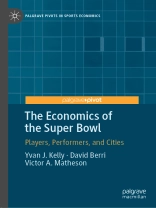The Super Bowl is the most watched sporting event in the United States. But what does participating in this event mean for the players, the halftime performers, and the cities who host the games? Is there an economic benefit from being a part of the Super Bowl and if so, how much?
This Palgrave Pivot examines the economic consequences for those who participate in the Super Bowl. The book fills in gaps in the literature by examining the benefits and costs of being involved in the game. Previously, the literature has largely ignored the affect the game has had on the careers of the players, particularly the stars of the game. The economic benefit of being the halftime performer has not been considered in the literature at all. While there have been past studies about the economic impact on the cities who host of the game, this book will expand on previous research and update it with new data.Mục lục
1. Introduction.- 2. The NFL and Origins of the Super Bowl.- 3. The Cities.- 4. The Players.- 5. The Performers.- 6. Summary and Conclusions.
Giới thiệu về tác giả
Yvan J. Kelly is Professor of Economics at Flagler College, USA. He has published articles in the Journal of Sports Economics, Quarterly Journal of Austrian Economics, and has been interviewed by USA Today, Newsweek, Sports Illustrated, NBA.com, Radio Free Russia, NPR, and other media.
David Berri is Professor of Economics at Southern Utah University, USA. Berri has spent the last two decades researching sports and economics. He has been part of more than 60 academic papers published on the subject of sports economics, with work that covers a wide variety of topics including the evaluation of players and coaches, competitive balance, the drafting of players, labor disputes, college sports, and gender issues.
Victor A. Matheson is Professor of Economics at College of the Holy Cross, USA. Victor is among the nation’s leading experts on the economics of both sports and gambling. He is the author of over 100 journal articles or book chapterson various issues relating to sports economics. He is the editor of the Journal of Sports Economics
and serves as the president of the North American Association of Sports Economists.












